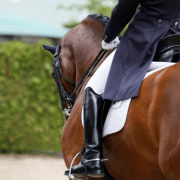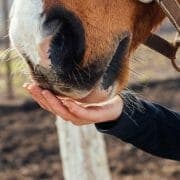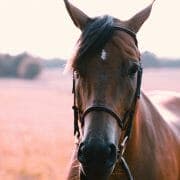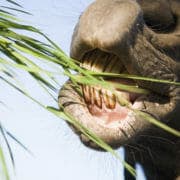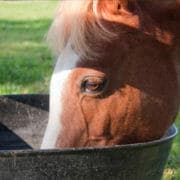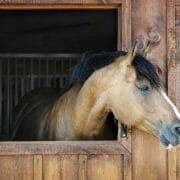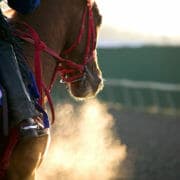Feeding before and during competition
6 Tips for Feeding Competition Horses
Here are 6 tips about the best way to feed your horse during multi-day competitions to reduce the risk of ulcers, maintain appetite and ensure an appropriate calorie intake for the duration of the competition.
1. Try to keep your horse’s ration (and water!) as close to what he has at home while you are away from home.
Some things you should be able to keep exactly the same (i.e. any hard feed you give) but some things will also change, especially if your horse is normally out grazing. In this case, try to keep the hay you will use when you are away as close to what his pasture is like. For example, if your horse grazes a grass pasture don’t suddenly change to alfalfa/lucerne hay while you are away.
2. Try to change your horse’s total ration to what he will be eating during the time at the competition as far ahead of time while you are still home as you can.
This particularly applies to hay, feed at least some of what he will be eating while away before you leave.
3. Travel your horse as much as possible on a full stomach to reduce the risk of ulcers.
Provide access to damped down hay while on the road (dampening reduces the risk of dust and other airborne particles ending up in the lungs) and stop at regular intervals (at least every 4 hours) to allow some grazing time and access to hay and/or his normal feed (eaten at ground level).
4. Talk to your veterinarian about medication to reduce or stop gastric acid production.
If your horse gets really stressed while traveling and away from home and is prone to ulcers you should speak with your veterinarian about using either a ranitidine or omeprazole based medication to reduce or stop gastric acid production during travel and competition to reduce the risk of ulcers forming.
This should also help with appetite and general attitude while you are away too.
5. Go easy on salt and electrolytes in your horse’s feeds!
Sometimes we tend to get carried away with wanting to add a lot more salt and electrolytes when we are on the road… BUT, too much and they will make your horse’s feed unpalatable (have you ever tried to politely eat something served to you that is way too salty? It’s not easy!). It will also aggravate any ulcers that may be present because salt on open wounds hurts!
Be mindful of the fact that horses sweating very heavily will need to have extra salt and electrolytes (e.g. polo and polocrosse horses, endurance horses, eventers etc) so chat with either your Vet or an experienced Nutritionist on the FeedXL team to work out how to best administer them.
6. Don’t forget to feed enough forage.
People traveling for long periods at a time often underestimate how much hay they should feed and as a consequence the horses lose condition while away from home.
For horses who do struggle to hold weight while they are away, feed as much hay as they want to eat (within reason, if they start eating more than 2.5 kg per 100 kg/ 2.5 lb/100 lb of bodyweight you may need to limit it) and always try to have hay they really like to eat. They get a massive amount of nutrition from hay and it keeps their entire gut and their mind in balance with the overall effect being better appetites and performance at a level you would expect.
Never restrict hay intake in an attempt to make them eat their hard feeds, it will likely have the opposite effect.
Do you have a question or comment? Do you need help with feeding?
We would love to welcome you to our FeedXL Horse Nutrition Facebook Group. Ask questions and have them answered by PhD and Masters qualified equine nutritionists and spend time with like-minded horse owners. It’s free!
Click here to join the FeedXL Horse Nutrition Facebook Group

